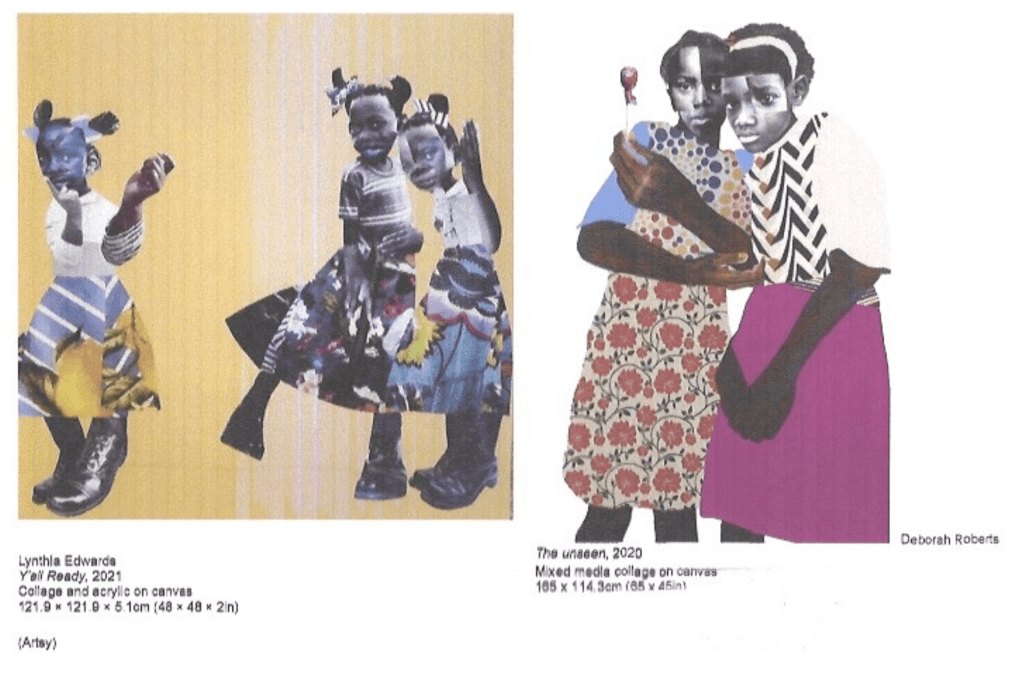The greater than two-year-long authorized dispute through which collage artist Deborah Roberts had sued artist Lynthia Edwards and Richard Beavers Gallery for alleged copyright infringement has been “amicably resolved,” in line with a joint assertion from all events.
“We acknowledge that Deborah Roberts has introduced a singular and vital voice to the medium of collage,” Beavers and Edwards mentioned within the assertion. “Many younger and rising artists have been impressed by Deborah and her work and have benefited from the help she has supplied and the door she has opened.”
Per a joint stipulation filed April 11 with america District Court docket for the Japanese District of New York, all pending claims relating to the case, which incorporates the unique go well with and a countersuit, have been dismissed with prejudice, which means that it can’t be reopened.
As a part of the authorized decision, Richard Beavers Gallery has pledged to make a financial contribution for an undisclosed sum to the Studio Museum in Harlem. The assertion cites Roberts as a “long-time supporter of the Studio Museum and has lengthy admired its dedication to innovation and cultural dialogue.” The assertion added that Beavers’s visits to the Studio Museum as a toddler along with his mom “had been a formative expertise,” and impressed his profession “offering a platform for rising artists of shade.”
The legal saga began in 2022, when Roberts, a Texas-based artist whose collage-style portraits of Black kids have earned immense business and demanding success, sued vendor Richard Beavers, his namesake gallery, and Edwards for “willful copyright infringement,” along with unfair competitors and market dilution. Round six months later, in February 2023, Beavers and Edwards filed a movement for the court docket to dismiss the case. Edwards, who additionally works in collage, claimed that Roberts was “punching down on an rising artist with a purpose to stifle market competitors and eradicate a aggressive menace.”
“This case is about an artist on the peak of her profession punching down on an rising artist with a purpose to stifle market competitors and eradicate a aggressive menace,” the dismissal request learn. “However the truth that each artists use the collage fashion or function kids of their artworks doesn’t help a copyright infringement declare. Using photo-based collage has deep roots within the work of Black American artists, and there’s a lengthy line of artists earlier than Roberts who’ve labored on this identical normal fashion.”
A decide finally decided that of the 16 works offered as proof within the case, 9 didn’t quantity to copyright infringement, nonetheless the remaining 7 bear such a level of similarity {that a} “whole idea and really feel of every collage is sufficiently much like defeat a movement to dismiss.” The case was allowed to proceed.
Choose LaShann DeArcy Corridor famous in her memorandum and order that she discovered benefit in Roberts’s argument, saying that “the complicated similarity between the Roberts Collages and the [Richard Beavers] Gallery Collages have already triggered, and can proceed to trigger, irreparable lack of repute and goodwill to [Roberts] as a result of prospects will stop to tell apart between the [respective collages] and may falsely ascribe the ‘poor high quality’” of the Edwards artworks to her personal.
In her authentic lawsuit, Roberts launched the problem of the “commerce costume,” or the impression of high quality of a business picture, and alleged that Beavers’s and Edwards’s use of “commerce costume misrepresents the character and traits of” Edwards’s collages and would consequently weaken her market.
The argument didn’t appear to issue into the decide’s resolution, nor did the precedents the artist’s group supplied. “These circumstances are unhelpful to her,” DeArcy Corridor wrote within the footnotes. Quite, she cited her particular person evaluation of the contested works, which she included within the abstract, writing, “every collage incorporates a younger black woman. Though the backgrounds and apparel differ, the poses of the woman in every collage are practically similar.”
She additionally famous that Beavers had invited Roberts in 2020 to promote her collages at his gallery and mentioned that “so lots of my shoppers have you ever on their want checklist of artists whose work they want to purchase for his or her collections.’” The abstract continued that after Roberts declined to point out along with his gallery, Beavers “organized” for Edwards to “discontinue her earlier inventive follow in order that she might create and promote collages” in a method like Roberts.
On the time, Maaren Shah, a associate on the regulation agency collectively representing Edwards and Beavers, advised ARTnews that Roberts’s grievance was merely “about extra established artists and galleries misusing their energy to suppress new creation and development. We filed these counterclaims to guard our shoppers’ rights to create and promote artwork that’s no much less worthy than the artwork that got here earlier than it.”
